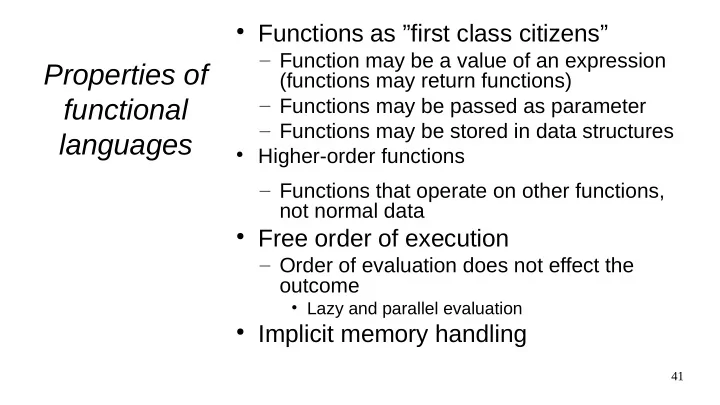

● Functions as ”first class citizens” – Function may be a value of an expression Properties of (functions may return functions) – Functions may be passed as parameter functional – Functions may be stored in data structures languages ● Higher-order functions – Functions that operate on other functions, not normal data ● Free order of execution – Order of evaluation does not effect the outcome • Lazy and parallel evaluation ● Implicit memory handling 41
● No assignment: "variable" is a questionable concept (doesn't vary...) Functionality ● "Opposite" of object-oriented programming (methods invoked on object, changing the object) ● Traditional for-loop is impossible, no loop variables ! – Instead, recursion or application of a function on a set (map) 42
● New variables/data can be created (and have to be initialized) Immutable ● Old variables/data cannot be data changed ● Garbage collection takes care of old unused data ● "Opposite" of object-oriented programming ● (Traditional for-loop vs. new range- for) 43
● Data structures (vector, lists, maps, ...) cannot be changed either! Functional ● Operations (insert, erase, ...) produce data new (changed) data structures structures ● Chain of operations: pass data from operation to operation ● Efficiency preserved by sharing data ● Compiler can also internally modify data structurs as "optimization" 44
● Scala maps: add new element 'john' with value 1): Functional m2 = m1 + ('john'->1) data ● Scala vectors: "Update" existing structures, vector by replacing 2nd element examples v2 = v1.updated(1, 'mary') ● Haskell arrays: replace first ten elements with zeroes ar2 = ar // [ (i, 0) | i <- [1..10] ] 45
● No side-effects, variables do not change ● → When a function is executed does not Laziness matter! ● Lazy evaluation: nothing is evaluated/executed until its value is really needed (= makes difference in the program) ● Haskell is a purely lazy language ● Scala & Clojure allow laziness explicitly ● Example: lazy infinite (generated) data structures allsquares = [ n*n | n <- [0..] ] 46
● Pure functional language ● Compiled, static typing at compilation Haskell time, type deduction ● Lazy evaluation ( nothing is evaluated before the value is used) ● Has increased in popularity, other languages have copied ideas from Haskell 47
● Expressions are evaluated only when used ● Alternate way of thinking: Haskell & – "Values" are parameterless functions that lazy are executed when needed evaluation – A variable contains a reference to a function that calculates its value – (in reality, memoization is used) ● Very powerful, allows "infinite" data structures, for example 48
● [1, 2, 3] ● [1..3] Haskell lists � [1, 2, 3], [1, 3..10] � [1, 3, 5, 7, 9] ● Strings: ['M', 'o', 'i'] � "Moi" ● Extending: 0 : [1, 2, 3] � [0, 1, 2, 3] ● joining: [0, 1] ++ [2, 3] � [0, 1, 2, 3] ● Lazy: list = 2 functions, first returns the 1st element, second the rest of the list. ● Infinite lists: – even = [2, 4..] – evensqr = [ n*n | n <- even] – elem 64 evensqr � True 49
● definition: plus x y = x + y ● call: plus (plus 3 4) 5 Haskell functions ● Piece-wise definition: fact 0 = 1 fact n = n * fact (n - 1) ● Parameter pattern matching: prod [] = 1 prod (fst:rest) = fst * prod rest fact2 n = prod [1..n] ● As-patterns , wildcards prod-not-empty par@(_:_) = prod par 50
● In tradiotional imperative programming (which you already Exercise know), how would you build a program solving the following: ● You receive a list/vector/whatever of strings, which are sentences (words + spaces) ● You should find out the maximum of the average word lengths of the senteces 51
Recommend
More recommend